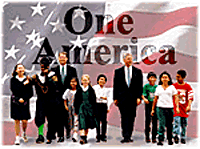 |
 |
The Interactive Multicultural Awareness Program on Race was created as a portion of a two-part series of interactive computer programs created by a team of faculty and students at Miami University-Oxford, Ohio from 1989 to 1994. The original laser disc version, and the subsequent CD-ROM version, depicts a re-enactment of documented racial incidents on campus and highlights the reactions and consequences of such incidents. The viewers are prompted by the program to select various action responses during the various scenes. In addition, viewers are provided with various resources to learn more about racism, injustice and ways to combat racism through community involvement.
A curricular process was used to create the Interactive Multicultural Awareness Program on Race. This comprehensive curriculum project was originated by Dr. Robert Vogel, Professor of Communication, in an attempt to address the problems of racial insensitivity on campus by involving students in a design process which employs the application of advanced communication technologies. Content, design and technology have been carefully integrated to provide a uniquely challenging educational experience and a product which effectively sensitizes users to a contemporary social concern. Students participating in Miami's Honors Program, representing every academic division of the university, enrolled in three sequenced courses. First, the content component encompassed a study of issues related to racism. Within a course on cultural awareness, taught by Dr. Ronald Scott, Associate Professor of Communication, students studied images of blacks portrayed in the media. Second, the technology component involved a wide variety of faculty and support staff. This course encompassed the design and production of the interactive program around the concepts learned within the cultural awareness component. Students divided into groups focusing on subject matter, computer design and video production and established a master flow chart detailing program layout, decision points and necessary interactive branching. Student programmers completed an extensive orientation to "HyperCard" authoring software and graphic design. Finally, within the implementation component, students piloted their work and studied strategies. This course, taught by Dr. Susan Mosley-Howard, Associate Professor of Educational Psychology, focused on the introduction of peer-led facilitated discussions. Evaluation strategies were developed under the guidance of Dr. Raymond White, Professor of Psychology, and were initiated to document the effectiveness of the process and the product. Throughout the three-course sequence, students were required to maintain journals of their experiences and complete course evaluations. One student expressed feelings of intrinsic satisfaction which were universally experienced by participating students.
Outcomes and Significant Accomplishments This program has been evaluated with approximately 3,000 exit surveys from college students and a lab study. Promising results were obtained from viewer responses. More can be learned about the evaluation of this project from the following sources: Videodisc Monitor 1990 issue, proceedings from the 1997 American Psychological Association conference, and an upcoming issue of Journal of Excellence in College Teaching.
|
![]()
To comment on this service,
send feedback to the Web Development Team.
![[White House icon]](/New/images/home_pin.gif)
![[Help Desk icon]](/New/images/help_pin.gif)